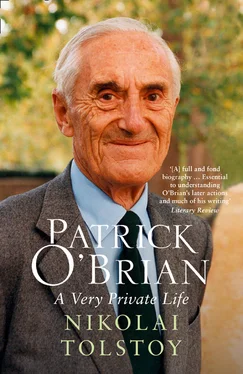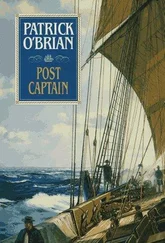Patrick was deeply concerned to secure the best education possible for Richard. In 1945 he had registered him for entry to Wellington College, a public school with a strong military tradition, with a view to his eventually obtaining a career in the Army. Unfortunately this was my father’s old school, which I in turn entered in January 1949. When my father was informed by Elizabeth that the O’Brians planned to send Richard there, he managed to persuade the Master of the undesirability of his attending the same school as me. The fact that my mother was at the time denied all contact with me presumably influenced the College’s concurrence with my father’s objection, which would now seem harsh and arbitrary. It is possible that some future unhappiness might have been avoided, had Richard and I been permitted to become friends from an early age.
The sincerity of Patrick’s concern to advance Richard’s education and future career cannot be doubted. The annual fees for Wellington were £160–£175 a year, which together with travel and additional expenses required a total expenditure of about £200 per annum. Yet his and my mother’s combined income for 1950–51 amounted to £341 6s 9d.[fn8] Nor was the proposed sacrifice any fanciful project, since they had earlier paid about £170 a year for Richard’s preparatory school fees and expenses.[4]
Eventually Richard came to believe that his father had contributed nothing material towards his education. In a press interview conducted over half a century later, he declared: ‘My father never offered to help … [I] had been sent to a boarding school in Devon by [my] mother … [My] mother found the fees increasingly difficult to pay.’[5]
Although Richard is unlikely to have been concerned at the time by the question of who paid his school fees, in retrospect his mother’s poverty-stricken circumstances (by her own account, she earned ‘between £3. 10. 0. and £4. 0.0. a week’, from invisible mending conducted in their home) might have made it plain that it could not have been she. Nor, given her upright character, does it appear likely that she would have made any attempt to deceive her son over the issue. Again, the fact that it was to Patrick and my mother that Richard looked for provision of all extras, ranging from school uniform and games kit to pocket money and railway travel, must have made it plain at the time who was meeting the bills.
Richard’s memory could well have deceived him after half a century. Unfortunately, it is necessary to demonstrate that it did do so, in order to counter accusations levelled at Patrick by others.
Denied entry to Wellington, in the autumn of 1949 Richard was enrolled at Cardinal Vaughan School in Holland Park. A place was found for him by Father de Zulueta, aristocratic priest of the Roman Catholic church in Chelsea, where Richard and his mother lived. My mother’s accounts show that she and Patrick spent substantial sums on Richard each year, although this did not include school fees, the institution being funded by the London County Council. Occasional financial assistance was probably also contributed by my grandfather, who was then living in Upper Cheyne Row around the corner from Richard and his mother. My mother’s brother Howard, known to the family as ‘Binkie’, recalled: ‘My Father told me that Patrick’s son had been brought to him in a hungry state by that kind Father Zulu. I have no doubt but that Pa would have given him a hand out despite his aversion to Patrick.’
Some years ago I heard from an old schoolfriend of Richard’s. Bob Broeder remembered him well:
Richard stood out from the rest of us as he spoke in a refined accent while most of us spoke in what can only be described as a London accent. As boys do, we asked each other which schools we had come from. When it came to Richard, he told us that he had been educated [i.e. tutored] by his father. This made him stand out even more.
Miserable though it had in part been at the time, it seems that Richard had already come to value his father’s didactic course of instruction – as he undoubtedly did not long after this. He might, after all, have confined himself to naming the Devonshire preparatory school he had attended previously.
A letter sent by Richard to Collioure at this time recounts his progress. (Here as elsewhere I retain his delightfully idiosyncratic spelling, which adds to the charm of the correspondence.)
Dear Daddy and Mary, I am very sorry I did not reply to your letter. The only subject I find easy is Greek, but altogether I get on nicely, in Latin we are doing the Relative pronoun, in French we are learning the presents of some irregular and regular verbs, in history we are doing Tudor times, in arithemetic we are about to begin fractions, in algebra we have not started similtanious equations, in geometry we are learning Euclid 1 .13. I find home-work very boring, but I do it, so far I have had only three penances. Here is a bit of news for Mary, I have growen out of my good old boots, I can’t get them on though last two months I could, my mother says please can I have several pairs of socks and some pugams pyjamers. My Mother says I will be taking my Exam in the spring or else I might stay where I am. I like the idea of the feast and wished I was there, but we can’t buy wishing-carpets. I will try very hard for a silent dog whistle [for Buddug] when I have time but most propally I’ll end up some where else. Please could I have a little money? I am very glad you are in your new home, have you had a shower-bath, I think when I come over I will invent a sort of bellows which you start off and stop when you want. I have never heard of a Praying Montis. I do not like getting up early but I do. I hope you and Daddy and Buddug are well? With love from Richard.
The ‘Exam’ in question was the Common Entrance for admission to public schools. The attempt to enter Richard for Wellington having been blocked, Patrick now sought to have him admitted to St Paul’s, a prestigious London public school. This would have enabled him to attend as a day boy, thus avoiding the heavy expense of boarding. Richard prepared for the examination in the summer of 1950, which in the event poor academic progress appears to have prevented his sitting. There is incidentally a suggestion that my mother attempted to persuade her father to break the modest financial trust he had settled on her, in order that she might devote the capital to Richard’s education. A passage in Patrick’s autobiographical novel Richard Temple may well allude to such a plea: ‘On the same reasoning he [Mrs Temple’s father, Canon Harler] had refused to let her touch the capital of her little trust-fund to send Richard to a better school: besides, he had never approved of her marriage and would lend its results no countenance.’[6]
Grim personal experience of the terrible financial crash of 1929 had left my grandfather with a visceral aversion to dispersion of capital.
Richard’s initial experience at Cardinal Vaughan had been less than happy. As his friend Bob Broeder further recalls:
As time went on he was the subject of verbal bullying and was given a nickname – ‘Sheep’s Brains’ … Things came to a head one day, when a large lad (who later went on to play rugby for the Wasps) confronted Richard & threatened him with violence. By this time I had had enough and although smaller than this lad I told him in no uncertain terms to pack it in. Psychology worked and he never troubled Richard again, the other boys saw what had happened and they in their turn left Richard alone.
Before long he had settled down well, at least with his fellow pupils. Writing to Collioure, he cheerfully declared: ‘Dear Daddy … I hope I pass the common entrance to St Pauls, though I am quite happy where I am.’ He and Bob Broeder had become fast friends. The latter retains a vivid memory of Richard’s cramped little home:
Читать дальше












